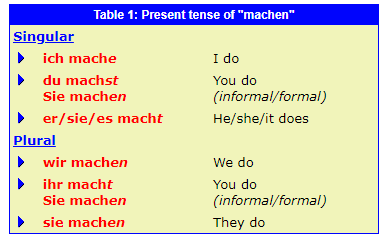The present tense of German verbs is formed from the infinitive of the verb. This is the part of speech which equates to the English "to do", "to speak" etc. In German, the infinitive almost always ends in "-en". To construct the individual forms, we remove the "-en" from the infinitive and add personal endings which link the verb with the subject in terms of person (i.e. first, second or third person) or number (i.e. singular or plural). We say that the verb 'agrees' with the subject, in that German verbs show the person and the number of the subject of the verb by means of their endings.

 英语
英语 日语
日语 韩语
韩语 法语
法语 西班牙语
西班牙语 意大利语
意大利语 阿拉伯语
阿拉伯语 葡萄牙语
葡萄牙语 越南语
越南语 俄语
俄语 芬兰语
芬兰语 泰语
泰语 丹麦语
丹麦语 对外汉语
对外汉语

